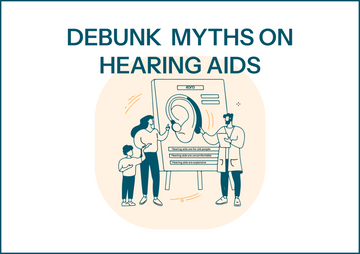As we step into an era of fast-paced technological advancements, combating hearing loss has transformed dramatically. Hearing aids, once considered bulky and rudimentary devices, are now evolving into sophisticated tech gadgets that not only enhance auditory capacity but also integrate effortlessly with our daily digital lives. Central to this evolution is the ability of hearing aids to become more smartphone compatible, paving the way for unprecedented convenience and functionality.
The Rise of Digital Technology in Hearing Aids
The digital revolution has undeniably influenced various industries, and the hearing aid sector is no exception. Today’s hearing aids are embedded with sophisticated digital technology allowing them to deliver clearer sounds and advanced features. Users no longer need to rely on just amplification; instead, they can benefit from a variety of functions designed for their specific hearing needs.
One of the most promising aspects of today’s hearing aids is their integration with smartphones. The rise of smartphone compatible hearing aids means users can directly control their hearing devices through a mobile application. This development not only enhances user experience but also adds a layer of personalization never seen before in hearing aids.
What to Expect in Future Hearing Aid Technology
Advanced Connectivity Features
Beyond simple volume control, the future of hearing aid technology is geared towards greater connectivity. In addition to smartphone compatible features, we anticipate hearing aids that can connect seamlessly with a range of devices, including televisions, home assistants, and even smart home devices. Imagine a world where your hearing aids sync with your home sound system, adjusting automatically for optimal sound clarity and personalized settings.
Enhanced Sound Quality
Future innovations are expected to push sound quality to new heights. Research and development are focusing on creating hearing aids that utilize machine learning and AI to differentiate between different types of sounds intelligently. This means hearing aids could automatically adjust to prioritize speech in crowded environments or filter out background noise based on the user’s preferences.
Customization and Personalization
The future of hearing aid technology is all about personalization. As we move forward, hearing aids will become highly customizable to suit the unique hearing profiles of each individual user. Through advanced applications, users may be able to perform real-time adjustments tailored to specific hearing environments, whether they are at a concert, restaurant, or enjoying a quiet evening at home.
Health Monitoring Capabilities
Incorporating health monitoring technology is another exciting frontier in hearing aid innovation. Future devices may not only improve auditory experiences but also track health metrics like heart rate, steps, or even stress levels. This integration could provide users with comprehensive information about their overall well-being, creating a holistic approach to health management.
Smartphone Compatible Hearing Aids: A Game Changer
The integration of smartphones with hearing aids has revolutionized the user experience. With smartphone compatible hearing aids, users can easily manage their devices directly from their pocket. Here are some key benefits of this technology:
- Adjust Settings on the Go: Users can easily adjust volume, switch between listening programs, and tailor sound preferences without hassle.
- Remote Support: Audiologists can provide real-time adjustments and support through mobile applications, reducing the need for in-person visits.
- Streamlined Notifications: Hearing aids can stream phone calls, music, and notifications directly to the device, enhancing everyday convenience.
The Impact of AI and Machine Learning
Artificial intelligence (AI) and machine learning are set to play crucial roles in the evolution of hearing aid technology. These technologies can adapt to environmental sounds while learning from user preferences over time. Such smart capabilities mean that hearing aids will not only improve sound quality but also create a unique auditory experience based on individual habits.
Machine Learning Algorithms
Imagine a hearing aid that learns which environments a user frequents. Over time, it could adapt settings according to sound patterns, enhancing clarity in those environments accordingly. Machine learning algorithms will process these environments and automatically switch between personalized settings, improving user experience in both familiar and new situations.
Enhancing User Interaction and Usability
The future holds exciting prospects for enhancing user interaction with hearing aids. Modern designs are focusing on user-friendliness, ensuring that people of all ages can navigate settings intuitively. Additionally, the intuitive nature of apps associated with smartphone compatible hearing aids means that even those who may not be tech-savvy can easily adjust their devices.
The Role of Virtual and Augmented Reality
Virtual and augmented reality (VR and AR) may also play a significant role in shaping the future of hearing aids. These technologies could provide immersive sound experiences for users, helping them better engage in social situations or rehabilitation sessions.
Regulatory Changes and Accessibility Improvements
As technology progresses, hearing aids are becoming more accessible. Recent regulatory changes are promoting innovations aimed at providing affordable solutions to those with hearing difficulties. The introduction of over-the-counter hearing aids could mean a significant shift in how consumers obtain these life-enhancing devices.
With greater accessibility, combined with a focus on smartphone compatible devices, more individuals will be able to benefit from advancements in hearing aid technology, resulting in improved quality of life for many.
Sustainability in Hearing Aid Technology
Another important consideration for the future is sustainability. Tech companies are becoming increasingly aware of the environmental impact of their products, and the hearing aid industry is no exception. We can expect future hearing aids to utilize eco-friendly materials and leverage recycling programs, making them not only beneficial for users but also kinder to the planet.
Smart Batteries and Charging Solutions
Innovations such as rechargeable hearing aids with smart batteries offer an eco-friendlier alternative to traditional disposable batteries. Users could enjoy longer-lasting power without the environmental waste associated with frequent battery replacements, aligning the hearing aid industry with sustainability goals.
The Psychological Impact of Advanced Hearing Aids
Aside from their practical benefits, improved hearing aid technology can have a profound effect on mental health and social interaction. Hearing loss often leads to feelings of isolation and depression. Therefore, hearing aids that effectively bridge the auditory gap enable users to engage with the world more fully.
The integration of advanced technology means that less conspicuous designs will likely emerge, allowing individuals to take pride in wearing them rather than feeling self-conscious. This shift in perception can lead to more significant usage and better outcomes for users.
Embracing Change: Future-Proofing Your Hearing
As we look to the future of hearing aid technology, it becomes vital for users and healthcare professionals alike to remain informed and adaptable. Staying abreast of innovations will ensure that everyone can maximize the benefits emerging from this technologically advanced landscape.
In this rapidly changing world, adapting to new hearing aid technologies means embracing opportunities for improved communication, engagement, and overall quality of life. With the integration of features such as smartphone compatible connections combined with rising AI capabilities, the future is bright for those impacted by hearing loss.
Your Hearing Journey Starts Today!
The journey to improved hearing does not end with traditional solutions. The evolution of hearing aid technology presents a pathway to a healthier, more connected lifestyle. By staying informed and open to new innovations, users can take charge of their hearing health, ensuring vibrant engagements in their personal and social lives. Embrace the possibility of a better auditory future!

























